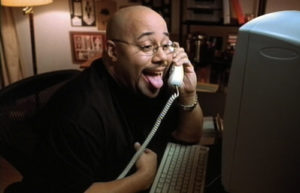 Humor in advertising can be a double-edged sword. Remember those funny Bud Light TV spots? No, not those–the old ones. The ones that led everyone’s favorite Super Bowl spot list for the past 20 years or so. Whatever happened to them?
Humor in advertising can be a double-edged sword. Remember those funny Bud Light TV spots? No, not those–the old ones. The ones that led everyone’s favorite Super Bowl spot list for the past 20 years or so. Whatever happened to them?
I won’t pretend to guess at the how or why, but I can tell you one thing. People like pointing at the TV and laughing a lot more than they want to hold round table discussions on “drinkability.” Bud Light had a reputation–even a duty–to entertain us, to get us talking around the water cooler. Suddenly, the slapstick was replaced with hard-sell. It was like your goofy old fraternity brother going all Amway rep on you.
This teaches us a couple of things. First, funny sells. It can be dangerous, because what you find funny might not appeal to everyone (and let’s be honest, we’ll never appeal to everyone–just most of our target audience). Also, failing to be funny and can be worse than not even trying. But when it works, there’s nothing more memorable.
I’ve had the good fortune to work on a number of brands through the years where humor was appropriate (McDonald’s, Heinz, Samsonite, Nintendo, even some restaurants here in Raleigh). Good thing for me, because that’s my default setting. And while it’s not suited to all brands or industries, you’d be surprised how effective it can be when it’s not expected.
When it comes to beer, humor is expected. Beer itself taught us this. It practically invented the genre, going back to the early “tastes great, less filling” spots of the 70s and 80s. Those spots actually delivered a message, made us laugh, and established a personality for the brand. Holy Schlitz, now that was some good advertising. Beer rarely has the advantage of strategic differentiation (something legitimately different about your product), so executional differentiation saves the day. Beer drinkers don’t care about whose beer tastes best, it’s whose beer has the funniest spots or the most inviting personality.
The second lesson here is that after a while, your brand is no longer your own. You lose the right to tamper with it and make seismic changes overnight, at least not without consequences. A brand is a relationship, a promise. Those things are not manipulated lightly. Bud Light forgot that, or worse, ignored it. They made a short-term tweak to a long-term strategy.
What happened? Sales fell.
How did Bud Light respond? By bringing back the funny.
Whenever someone insists that they can use rational persuasion to sell an emotional product, I remind them of the Manilow Challenge, a desperate attempt by RCA to convince music buyers that Barry’s schmaltzy 1985 album was every bit as catchy and relevant as anything on the radio–or your money back!
As they say, funny or die.